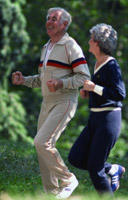If you wanted to start today to reduce your chances of getting cancer, what would you have to do? Lose excess weight, get more exercise, eat a healthy diet and quit smoking.
Those basic behavior changes would have a tremendous impact on the incidence of the most prevalent types of cancer — lung, breast, prostate and colon cancer — says Graham Colditz, M.D., Dr.P.H., associate director of Prevention and Control at the Siteman Cancer Center at Washington University School of Medicine in St. Louis and Barnes-Jewish Hospital. “We estimate that more than 50 percent of cancer incidence could be prevented if we act today on what we already know,” Colditz says.
Every year, more than 500,000 Americans die from cancer. The National Cancer Institute estimates that on average each person who dies from cancer loses 15 years of life, and altogether cancer deaths were responsible for nearly 8.7 million person-years of life lost in 2003, the most recent year for which the data were available.

“The loss of life and earning potential and the social impact of cancer are enormous,” Colditz says. “Reducing risk by adopting lifestyle changes like quitting smoking and losing weight isn’t always easy, but it may help to remember that these behavior changes can also reduce your risk of heart disease, diabetes, stroke and osteoporosis.”
Colditz’s recommendations for preventing cancer also include avoiding excess alcohol consumption, taking a multivitamin with folate and protecting yourself from too much sun and from sexually transmitted diseases.
Colditz recently became leader of the Siteman Center’s cancer prevention program having previously headed the Harvard Center for Cancer Prevention.
Physical fitness

Estimates hold that 20 to 30 percent of the most common cancers in the United States stem from being overweight or physically inactive. Research has linked weight gain to common cancers such as breast and colon cancer, as well as uterine, esophageal and renal cancers. “Women who lose weight in their adult years reduce their risk of breast cancer significantly,” Colditz notes.
Furthermore, he asserts that a clear connection exists between higher levels of physical activity and lower incidence of cancer. “For example, even after diagnosis of breast cancer, physical activity has an impact on recurrence and survival,” he says.
Consumption
What people breathe in, drink or eat can influence whether they get cancer. It’s well known that smoking is associated with lung cancer, but less commonly understood is that smokers also are more likely to get colorectal cancer as well as kidney, pancreatic, cervical and stomach cancers.
“The rate at which risk drops after stopping smoking varies for different cancer sites,” Colditz says. “But it’s very clear that within five to 10 years there will be a 50 percent reduction in cancer risk compared to people who keep smoking.”
Although some recent evidence has suggested that wine and other alcoholic beverages may contain beneficial components, other data show that overconsumption of alcohol increases the possibility of getting oral, esophageal, breast and other cancers.
Eating a plant-based diet can help protect against cancer. People who eat diets rich in fruits and vegetables have a lower danger of cancers of the colon, mouth, pharynx, esophagus, stomach and lung. Diets high in red meat and animal fat increase the probability of certain cancers. “There’s a strong, consistent relation between higher intake of red meat and higher risk of colon cancer,” Colditz notes.
High intake of folate, a B vitamin, may protect a person from cancer, and epidemiological studies suggest that low folate status may play an important role early in cancer development. Colditz says experts recommend taking a multivitamin that contains folate every day.
Other factors
Reducing long-term exposure to the sun and to artificial light from tanning beds, booths and sun lamps can lower the danger of getting non-melanoma skin cancer. Avoiding burns and other damage from these sources — especially in children and teens — can reduce the chances of getting melanoma skin cancer.
Certain viral infections have also been strongly linked to cancer development. Some of the most important of these are human papillomavirus (HPV), a cause of cervical cancer, hepatitis B and C viruses, major causes of liver cancer, and Helicobacter pylori, which accounts for the majority of cases of stomach cancer. HPV can be spread by sexual contact, and vaccine-conferred immunity results in a marked decrease in precancerous lesions.
As with the new cervical cancer vaccine, advances in chemoprevention will likely add to the prevention potential that comes from healthy lifestyle choices. “In the future we’ll be seeing a range of new preventative strategies,” Colditz indicates. “For example, the National Cancer Institute has a trial looking at selenium as a supplement to prevent cancer. And research shows that antiestrogens may reduce the risk of breast cancer by 60 to 80 percent in women after menopause.”
Washington University School of Medicine’s full-time and volunteer faculty physicians also are the medical staff of Barnes-Jewish and St. Louis Children’s hospitals. The School of Medicine is one of the leading medical research, teaching and patient care institutions in the nation, currently ranked fourth in the nation by U.S. News & World Report. Through its affiliations with Barnes-Jewish and St. Louis Children’s hospitals, the School of Medicine is linked to BJC HealthCare.
Siteman Cancer Center is the only NCI-designated Comprehensive Cancer Center within a 240-mile radius of St. Louis. Siteman Cancer Center is composed of the combined cancer research and treatment programs of Barnes-Jewish Hospital and Washington University School of Medicine.